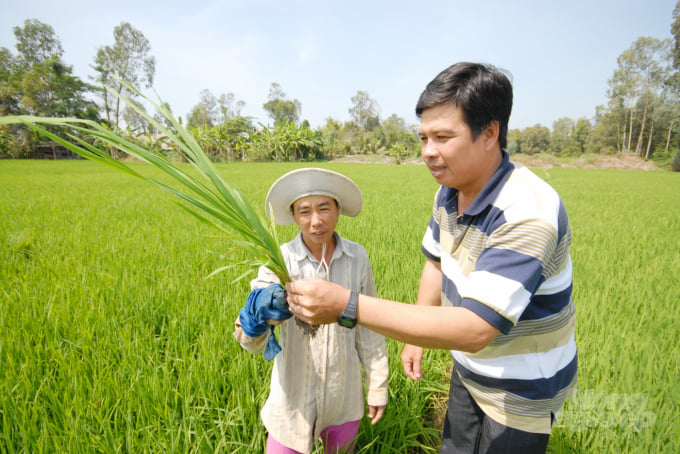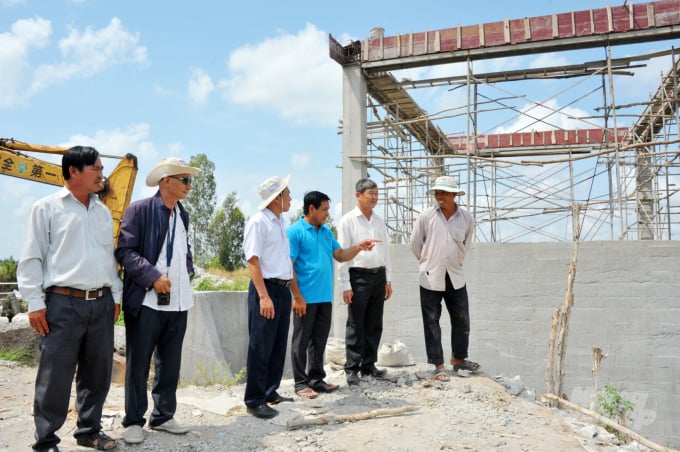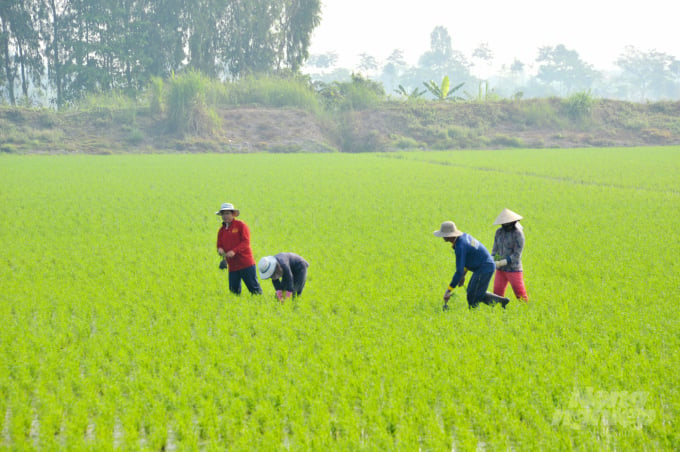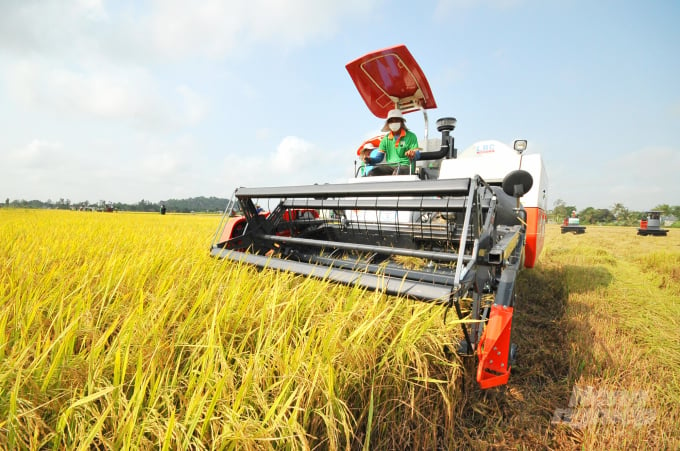May 18, 2025 | 17:50 GMT +7
May 18, 2025 | 17:50 GMT +7
Hotline: 0913.378.918
May 18, 2025 | 17:50 GMT +7
Hotline: 0913.378.918
In the past seven years, thousands of rice farmers in the Mekong Delta have been excited about the great “revolution” called VnSAT (Vietnam-Sustainable Agricultural Transformation).
The project has caused significant changes in rice production practices in the region and modernized traditional agricultural production thinking.
Since its launch, Mekong Delta farmers have boldly and proactively associated with businesses, applied new scientific and technical advances to their production while reducing fertilizers, pesticides, seeds and applying mechanization synchronously, which has contributed to increase profits by 20-30% compared to traditional methods.

The great "revolution" named VnSAT has caused a drastic change in rice production practices and improved the quality of export services. Photo: Le Hoang Vu.
An Giang is the second largest rice producing province in the Mekong Delta, yielding about 4.2 million tons of rice each year. In terms of productivity, the province has always taken the lead in producing high quality rice for export in the region over the years, particularly with the support of VnSAT.
The local farmers have been harvesting the winter-spring crop 2021-2022 since mid-March.
Le Van Chinh, Director of Tan Dong Agricultural Cooperative (My Phu Dong Commune, Thoai Son District, An Giang) led us to visit the field of the cooperative that has been selected for investment in building solid infrastructure for rice production.
All canals in the region have had solidified culvert systems, electric water pumps and concrete inner-field roads lined with trees, making the vast rice fields as beautiful as an eco-tourism area.
Chinh happily said that the cooperative has cooperated with Loc Troi Group this year's winter-spring rice crop to ensure the consumption of rice varieties like Dai Thom 8, OM5451, IR50404, OM3830, Loc Troi… on an area of about 200 hectares with an output of thousands of tons.
In particular, more than 80 per cent of farmers in the cooperative in the sub-region have successfully applied the techniques to improve the rice quality and therefore, the price of rice has increased, from VND6,400 /kg to VND6,800 /kg for Japanese rice and VND4,900 /kg to VND6,000 /kg for regular rice.

Solid infrastructure for many cooperatives in the Mekong Delta have receceived investment within VnSAT Project to produce rice sustainably and adaptively to climate change. Photo: Van Vu.
In the winter-spring crop 2020-2021, My Phu Dong Commune has also received a total investment of VND13. 3 billion within VnSAT project to upgrade and repair the dyke and the intra-field traffic on the north bank of the My Giang canal with a total cost of VND13. 3 billion.
Previously, local farmers used to transplant up to 300kg of seeds/ha. Due to the high density of the transplantation, pests and diseases frequently appeared so the cost of fertilizers and pesticides also increased accordingly.
In addition, though some households that were members of rice production cooperatives were supported by enterprises, the transportation of rice still faced many difficulties as it had to depend on waterways.
Meanwhile, the rice must be transported to the warehouses as quickly as possible when it is harvested. Otherwise, the rice quality would be affected and disqualified for export. Therefore, when the harvest was in full swing, there was a shortage of means of transport (mainly boats).
In the past four years, the VnSAT has supported investment in building roads, creating convenience for harvesting and transporting rice in the shortest time.

The VnSAT project has bridged farmers and businesses in rice production and consumption. Photo: Le Hoang Vu.
“I moved from Nui Sap Town to settle here in 1984,” said farmer Nguyen Van Hai, a member of Tan Dong Agricultural Cooperative.
“Local farmers used to dream of having a clean, dry road for students to go to schools and for convenient rice transportation. The long cherished dream has been realized by the VnSAT Project.
“Under the guidance of the specialists within the project, other farmers and I have practiced sparse transplantation, reducing the amount of seeds to only 100 kg/ha. The fields have very few pests and diseases and the yield is stable at the end of the crop and sold at a high price,” he added.
The key to the production and consumption linkages between farmers and enterprises is the participation of enterprises.
Therefore, the VnSAT An Giang Project and the Department of Agriculture and Rural Development have organized many meetings with businesses and selected those with real needs in building high-quality rice material areas.
At the same time, many seminars have been organized at districts and communes so that businesses could approach local authorities, cooperatives and farmers. Those that are committed to the contracts will receive farmers’ positive responses and active participation.

The application of innovated production processes has been effective and being replicated by farmers in the Mekong Delta. Photo: Van Vu.
According to Nguyen Sy Lam, Director of An Giang Department of Agriculture and Rural Development, the provincial agriculture sector and the VnSAT Project Management Board have been concerned about the training and the implementation of rice cultivation model according to VietGAP and SRP to improve farmers' capacity and meet the needs of businesses.
He said the good implementation of the initial linkage models created a strong spillover effect in the area where the VnSAT was deployed.
The areas of production-consumption linkage between cooperatives and enterprises under contract have increased constantly after each crop. The highest contract production area is the winter-spring crop 2019 - 2020 with 6,037 hectares, reaching 107% of the assigned target.
Many enterprises have been enagaged in stable associations such as Loc Troi Group Joint Stock Company, Tan Vuong Co., Ltd., An Giang Import-Export Joint Stock Company (Angimex), Gentraco Co., Ltd, among others.
Translated by Phuong Ha

(VAN) 14 out of 35 domesticated elephants in Dak Lak province have had their living conditions improved, with 11 of them currently participating in the non-riding elephant tourism model.

(VAN) Muong Nhe Nature Reserve hopes that being upgraded to a national park will lay the foundation for forest protection efforts to be carried out in a systematic, modern, and sustainable manner.
/2025/05/16/3923-2-171845_52.jpg)
(VAN) Lower costs, higher yields, and improved soil quality are outstanding benefits that soybeans bring when integrated into the crop rotation system.

(VAN) The 'For a Green National Environment' programme aims to promote a green lifestyle, support businesses in implementing ESG practices, and turn Net Zero commitments into concrete actions.

(VAN) Cold-barn systems efficiently manage environmental and temperature conditions, which aids in the prevention of respiratory diseases in pigs and protects them from the vectors that transmit African swine fevers.

(VAN) To tackle challenges, the project 'Addressing key technical bottlenecks in the grouper supply chain in Vietnam' has been underway since 2024.

(VAN) The project 'Disease-Resilient and Sustainable Cassava Production Systems in the Mekong Region', funded by the Australian Center for International Agricultural Research (ACIAR), is being implemented from 2024 to 2028.